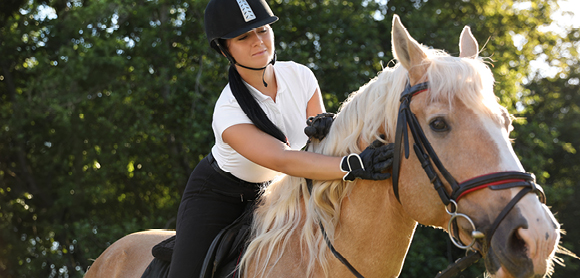
TREC – all you need to know
Do you fancy trying something new with your horse? TREC could be just the challenge you’re looking for. Find out everything you need to know about this exciting equestrian sport.
Competing in the traditional disciplines of dressage, jumping and eventing doesn’t appeal to everyone. But riders can take part in other events that have a competitive edge and require a different set of skills. One of these is TREC.
TREC combines elements of negotiating obstacles, mounted orienteering and trail riding, intending to test the skills of horse and rider in planning and executing a long-distance ride in an unfamiliar area.
With an emphasis on horsemanship and having fun, rather than horsepower, TREC is a growing discipline that offers riders an interesting and competitive challenge. Not only will you and your horse learn skills you can put into practice when you’re riding at home and out hacking on the road, you’ll also strengthen your partnership.
How did TREC start?
TREC originated in France as a sport designed to test the skills of trekking guides working in the equestrian tourism industry. These skills include being able to navigate a mapped route, manage the pace of the whole group, and safely negotiate any obstacles you might come across on an extended trail ride or drive. It was introduced in the UK in the early 1990s.
Where did the name TREC come from?
The word TREC is an acronym of the French name ‘Techniques de Rondonee Equestre de Competition’, which loosely translates to Equestrian Trail Riding Competition.
Components of TREC
There are three phases in a TREC GB event: orienteering, control of paces and obstacles.
- The orienteering phase (POR) requires you to navigate a route of six to nine miles at level 1, or nine to 15 miles at level 2. You’ll be given a speed that’s been chosen to suit the terrain and weather conditions, and the challenge is to complete the route as close to the optimum time as possible. As you progress through the levels, the routes get longer and more complicated.
- The control of paces phase (MA) tests how slowly your horse can canter and how fast they can walk over a measured distance without breaking into a trot.
- The obstacle course (PTV) is designed to test your ability to negotiate problems you might find while hacking out, such as opening a gate or riding under low branches. Each obstacle has a maximum score of 10 points, which are given for accuracy and style. If there’s something you don’t want to do, or can’t do, such as mounting from the ground or jumping a small log, you can simply move on to the next obstacle.
You can compete individually or as a pair.
When do TREC events usually take place?
TREC GB events run throughout the year. In the summer you compete in all three phases, while in the winter there is no orienteering phase and the other phases are often held in an arena.
How to get involved with TREC
There are 15 TREC GB clubs across the UK which offer training sessions and competitions. You don’t need to be a member to take part, but taking out a membership gives you discounted entries and means you are eligible to qualify for the national championships.
Who can take part in TREC?
One of the great aspects of TREC is that anyone with a horse can have a go. Just make sure you are both fit enough to cope with the demands of the sport. An understanding of map reading and orienteering is an advantage, but you’ll soon learn if you’ve never done it before.
What sort of horse do you need?
Most horses or ponies can join in. As long as your horse is capable of hacking six to nine miles in around two hours, they’ll be able to cope with a full TREC GB event competition. You can start with obstacle clinics and winter competitions while you’re improving your horse’s fitness.
TREC is a Petplan Equine Group 3 activity, along with unaffiliated dressage and show jumping. If you want to get involved with TREC, make sure you review your Petplan Equine insurance policy to ensure that you’re covered.
The benefits of TREC
TREC is a great way to enjoy everything the countryside has to offer, while developing your riding skills and improving your bond with your horse. You’ll make great friends along the way and visit some beautiful places that you might not otherwise have access to.
It’s also brilliant motivation to keep both you and your horse fit. The skills you learn during TREC will also benefit other areas of your riding, such as making opening gates and other obstacles easier to negotiate while out hacking.
What will I need?
There is no dress code for TREC, but suitable riding attire is advised:
- A hard hat complying with current TREC GB standards
- An approved body protector (compulsory only on the PTV obstacle course if a ridden fixed jump is included)
- Head collar and lead rope (only required on PTV if competing with a martingale)
For the orienteering POR phase, riders must also carry the following equipment:
- Medical armband (also required on PTV)
- Horse ID with rider number and emergency phone number
- First-aid kit (human and equine)
- Torch
- Whistle
- Clearly visible fluorescent and reflective hi-viz clothing
- Hoof pick (it is also compulsory to carry a hoof boot at L3 and above)
- Compass
- Pens
- Waterproofs
- Mobile phone – optional (switched off and in provided sealed bag)
Do you compete in TREC? If so, we’d love to hear from you. Let us know on the Petplan Equine Facebook page.



